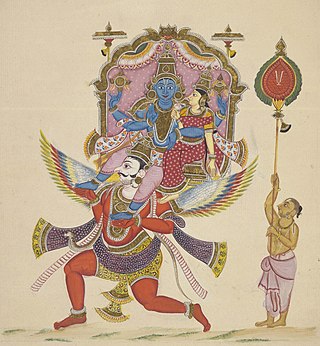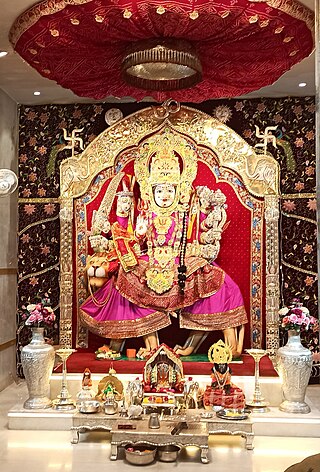
Hari is among the primary epithets of the Hindu preserver deity Vishnu, meaning 'the one who takes away' (sins). It refers to the one who removes darkness and illusion, the one who removes all obstacles to spiritual progress.

Vaikuntha, also called Vishnuloka, and Tirunatu (Tirunāṭu) in Tamil, is the abode of Vishnu, the supreme deity in the Vaishnava tradition of Hinduism, and his consort, Lakshmi, the supreme goddess.

Govinda, also rendered Govind, Gobinda and Gobind, is an epithet of Vishnu and is also used for his avatars such as Krishna. The name appears as the 187th and the 539th name of Vishnu in the Vishnu Sahasranama. The name is also popularly addressed to Krishna, referring to his youthful activity as a cowherd boy.

Keshava is an epithet of Vishnu in Hindu tradition. The name appears as the 23rd and 648th names in the Vishnu Sahasranama of the Mahabharata. Keshava is also venerated by those persons wanting to avert bad luck or ill-omens. His consort is Kirti (Lakshmi).

Madhusudana is an epithet of Vishnu and is the 73rd name in the Vishnu Sahasranama.

Mahavishnutransl. 'Great Vishnu' is an aspect of Vishnu, the principal deity in Vaishnavism. In his capacity as Mahavishnu, the deity is known as the Supreme Purusha, the absolute protector and sustainer of the universe, the one who is beyond human comprehension, and all attributes.

The Bhagavata tradition, also called Bhagavatism, refers to an ancient religious sect that traced its origin to the region of Mathura. After its syncretism with the Brahmanical tradition of Vishnu, Bhagavatism became a pan-Indian tradition by the second century BCE, according to R.C. Majumdar.

Madhava is one of the primary epithets of Vishnu and Krishna. The word Mādhava in Sanskrit is a vṛddhi derivation of the word Madhu, which means honey. It is a title of Krishna, referring to his lineage as 'he who appeared the Madhu dynasty'.

Lakshmi Narayana or Lakshmi Narayan is the dual representation of the Hindu deities Vishnu, also known as Narayana, and his consort, Lakshmi, traditionally featured in their abode, Vaikuntha. The goddess of prosperity and beauty, Lakshmi, is depicted as standing next to Vishnu, who holds the Panchajanya, Kaumodaki, Padma, and the Sudarshana Chakra. Another depiction of Lakshmi-Narayana portrays Lakshmi in the service of Narayana, who reclines on the cosmic serpent Shesha, floating in the Kshira Sagara, the Ocean of Milk.

In Hinduism, the concept of God varies in its diverse religio-philosophical traditions. Hinduism comprises a wide range of beliefs about God and Divinity, such as henotheism, monotheism, polytheism, panentheism, pantheism, pandeism, monism, agnosticism, atheism, and nontheism.

Bala Krishna or Bala Gopala, refers to the boyhood form of the Hindu deity Krishna. The worship of Krishna as a divine child was historically one of the early forms of worship in Krishnaism.

Krishnaism is a term used in scholarly circles to describe large group of independent Hindu traditions—sampradayas related to Vaishnavism—that center on the devotion to Krishna as Svayam Bhagavan, Ishvara, Para Brahman, who is the source of all reality, not an avatar of Vishnu. This is its difference from such Vaishnavite groupings as Sri Vaishnavism, Sadh Vaishnavism, Ramaism, Radhaism, Sitaism etc. There is also a personal Krishnaism, that is devotion to Krishna outside of any tradition and community, as in the case of the saint-poet Meera Bai. Leading scholars do not define Krishnaism as a suborder or offshoot of Vaishnavism, considering it at least a parallel and no less ancient current of Hinduism.
Svayam Bhagavan is a Sanskrit concept in Hinduism, referring to the absolute representation of Bhagavan as a singular deity in a monotheistic framework. The concept is most commonly associated with a male deity, for instance in Hindu sub-movements like Krishnaism and Gaudiya Vaishnavism, in which Krishna is regarded as Svayam Bhagavan.

Para-Vasudeva is a term found in the Vaishnavism tradition of Hinduism. It refers to the supreme and transcendental form of God, from which all of his manifestations emerge. The shakti of this form of God is regarded to contribute to the avataras, the material appearances of the deity on earth.

Sushena is an epithet of Vishnu, cited in the epic Hindu hymn Vishnu Sahasranama. Several characters described in the Hindu texts also have the name Sushena.

Sharanga, is the celestial bow of the Hindu god Vishnu, primarily associated with his avatara of Rama. In South India, the Sharanga is also simply known as the Kodanda, literally meaning bow. Rama is often praised as Kodandapani, the holder of the Kodanda. The attribute of the bow is also mentioned in the Vishnu Sahasranama.

Ekanamsha is a Hindu goddess. She is primarily identified with the illusory power of Vishnu is Yogamaya.

Yogamaya, also venerated as Vindhyavasini, Mahamaya, and Ekanamsha, is a Hindu goddess.

In Hinduism, the Karanodaka or the Garbhodaka, also referred to as the Causal Ocean, is the origin of material creation. It is the place in the spiritual sky where Mahavishnu lies down and creates the material world. The Causal Ocean is the border between the spiritual and material worlds.




















